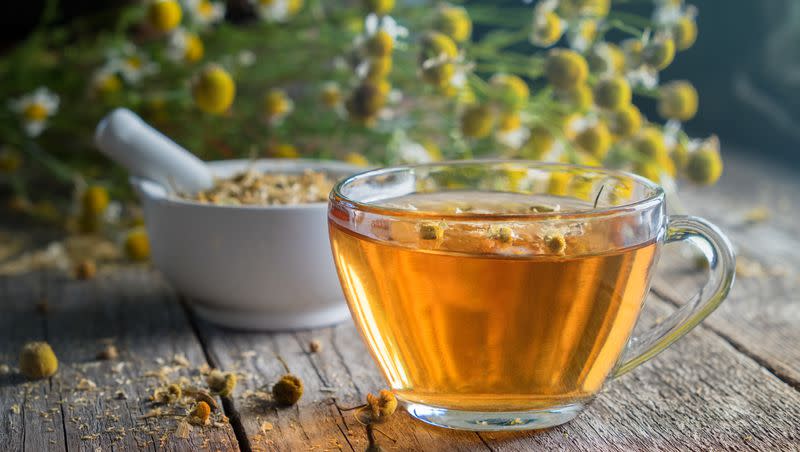5 drinks to ease anxiety and boost mood

To ease feelings of anxiety and boost your mood, some drinks and herbal teas offer natural remedies. Some drinks, such as beverages with lots of caffeine, can actually exacerbate feelings of anxiety.
Let’s take a look at five drinks proven to help with feelings of anxiety.
Related
1. Chamomile reduces anxiety and improves mood
Chamomile is an herb that is known to help calm anxiety because it contains both antioxidant and anti-inflammatory properties, which are known to reduce inflammation associated with anxiety, reports Healthline. Chamomile is also believed to help regulate neurotransmitters associated with mood, such as dopamine and serotonin. Evidence shows drinking chamomile tea can ease feelings of anxiety.
Researchers reviewed several studies on chamomile as a treatment for generalized anxiety disorder. Over a two- to four-week period, those who consumed chamomile experienced improved symptoms of anxiety and “a significant improvement in sleep quality after chamomile administration.”
A 2017 study observed 179 adults with generalized anxiety disorder. Over the course of five years, participants who consumed 1,500 milligrams of chamomile extract per day experienced significantly lower symptoms of generalized anxiety disorder.
Another study, published in 2012, found that those who consumed chamomile extract for two months experienced reduced symptoms of anxiety and depression.
2. Ashwagandha has been used to treat anxiety for thousands of years
Ashwagandha is an herb often taken as a pill supplement, but it can also be put in drinks — it is considered an adaptogen, a substance used to relieve stress. Ashwagandha has been used to treat anxiety and increase energy for thousands of years, reports a 2020 study.
“Ashwagandha is a nontoxic herb gaining attention in the U.S. for its ability to modulate stress and anxiety. The herb is an important part of centuries-old Ayurveda, the traditional system of medicine in India, and is used to treat a range of conditions, such as rheumatism and insomnia,” writes Forbes.
In a 2019 study, adults were given ashwagandha extract to consume every day for two months. Half the participants were given a placebo. Those who took the ashwagandha extract reported feeling a significant improvement in anxiety.
Ashwagandha can improve several mental health conditions, including anxiety. A 2021 review of several studies found that ashwagandha has anti-stress and anti-anxiety properties and may also help relieve depression, insomnia and other mental health-related challenges.
3. Ginger can treat stress and sharpen the brain
Ginger tea is an herbal drink made using ginger root. Several herbal teas include ginger because of its antioxidant and anti-inflammatory properties and ability to treat stress, per Johns Hopkins.
Animal studies have found that ginger may ease stress and treat anxiety as effectively as benzodiazepine drugs such as Xanax and Valium. Additional animal studies report that ginger can boost seratonin levels.
A study from 2012 reports that ginger may keep the mind sharp by protecting the brain from oxidative stress-related damage. As part of the study, healthy, middle-aged women consumed ginger extract everyday for two months. The women experienced improved memory and cognitive processing.
4. Warm milk has calming properties
Milk is an excellent source of tryptophan, a neurotransmitter your body cannot produce, so you need to get it through your diet. Tryptophan plays a role in serotonin production and may be beneficial for mood, reports WebMD.
Casein tryptic hydrolysate, a protein found in milk, might also help ease anxiety and promote restful sleep due to its calming properties, studies show.
“Milk’s sleep-enhancing properties are commonly ascribed to tryptophan, but scientists have also discovered a mixture of milk peptides, called casein tryptic hydrolysate (CTH), that relieves stress and enhances sleep,” reports the American Chemical Society.
5. Turmeric decreases stress
Turmeric is a spice packed with curcumin, a chemical compound known for assisting in brain health and preventing anxiety disorder, according to research. Turmeric is often mixed into drinks such as tea or into golden milk, per Medical News Today.
A 2020 study observed 80 participants in a parallel, double-blind, randomized, placebo-controlled clinical trial. Participants received 80 milligrams of curcumin or placebo capsules to take daily for the course of two months.
Participants who consumed the curcumin capsules reported significantly lower feelings of anxiety, stress and depression levels than those given the placebo.
Research suggests turmeric may be as effective in treating mood disorders as antidepressant medication Prozac.
A 2017 animal study found rats that consumed curcumin experienced reduced anxiety, suggesting curcumin could be used as anti-anxiety in humans.
“Reduction of anxiety, and increase in brain production of docosahexaenoic acid, an agent extremely related to anxiety, was observed following curcumin administration in rodents,” the study writes.
Coffee and energy drinks can increase feelings of anxiety
Certain drinks can exacerbate feelings of anxiety. Drinks with high caffeine content, lots of sugar or artificial sweeteners might lead to increased stress.
“When you eat something that’s high in sugar, it causes your blood sugar to spike and then drop faster than it would if you had something that was more balanced with protein, carbs and fat,” Maggie Michalczyk, a registered dietitian, tells U.S. News & World Report. “This spike and drop can exacerbate feelings of anxiety and feel almost like a panic attack for some.”
In moderate servings, caffeine is not harmful, but those who drink a large caffeinated beverage everyday report feelings of anxiety. A 2015 study found that adults and adolescents who consumed more than 400 milligrams of caffeine every day reported having anxiety and other mood disorders.
“Overuse of caffeine can cause anxiety symptoms, and on the flip side, symptoms of anxiety may become worse with the use of caffeine,” writes Medical News Today.
The Mayo Clinic recommends healthy adults keep their daily caffeine intake to less than 400 milligrams per day to avoid feelings of nervousness, irritability, increased heartbeat and anxiety associated with drinking too much caffeine.

